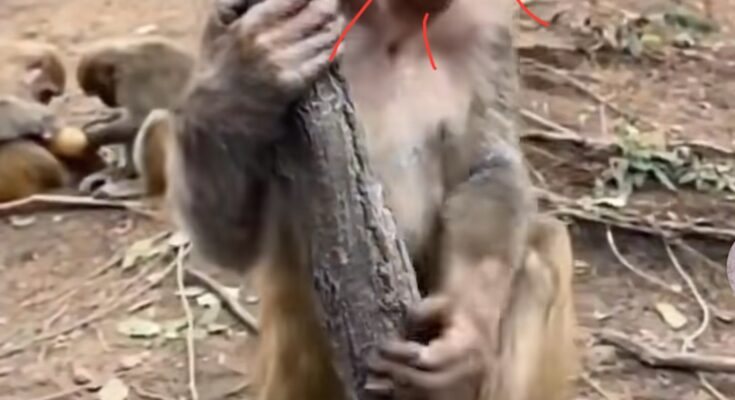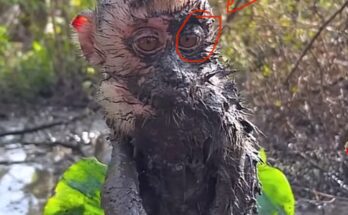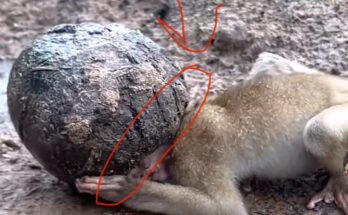In the heart of a dense forest where life thrives with both beauty and danger, a tragic yet touching story unfolded—a baby monkey, no older than a few weeks, found itself alone, frightened, and in pain after losing its mother and suffering a bee sting.
The little primate’s ordeal began on a quiet morning. A sudden skirmish between rival monkey troops scattered the group, separating the infant from its mother. Confused and helpless, the baby monkey clung to a low-hanging branch, letting out soft cries that echoed through the trees—calls that went unanswered.
In the wild, separation from a mother is often a death sentence for a newborn. Mother monkeys provide not just food, but warmth, grooming, and protection from predators. Without that bond, the baby is left vulnerable to threats it doesn’t yet understand.
As if fate hadn’t dealt enough cruelty, the frightened baby wandered into a patch of flowering plants—an area heavily trafficked by bees. The scent of panic mixed with blooming nectar may have triggered a defensive response from a nearby bee colony. A single bee, sensing movement, stung the tiny monkey near its eye. The sharp pain caused the baby to tumble from the bush with a yelp.
Fortunately, nearby villagers who had grown used to the presence of monkeys in the area heard the cries. One compassionate woman, known in the village for helping injured animals, rushed to the scene. She found the baby trembling, one eye swollen, clearly in distress.
“I knew he had no chance on his own,” she later shared. “He was so small, and you could tell he was looking around for his mother.”
The baby was gently wrapped in a towel and taken to a local wildlife rescue center, where veterinarians treated the sting and began round-the-clock care. Though traumatized, the little monkey began to recover slowly, gaining strength and confidence with each passing day.
This story, while heartbreaking, is not unique. Many wild animals suffer due to natural causes, habitat loss, or accidental human interference. What sets this story apart is the compassion shown by humans in a moment of need.
Wildlife experts emphasize the importance of supporting rescue and rehabilitation efforts. While not every human intervention is appropriate, trained wildlife professionals can make the difference between life and death for orphaned animals.
As for the baby monkey, now affectionately named “Bittu” by his rescuers, he is thriving. Though he may never return to the wild, he now lives in a sanctuary surrounded by other rescued primates, receiving the care and companionship he lost too early.
Let Bittu’s story be a reminder of the fragile balance in nature—and the power of kindness when that balance is disrupted.



